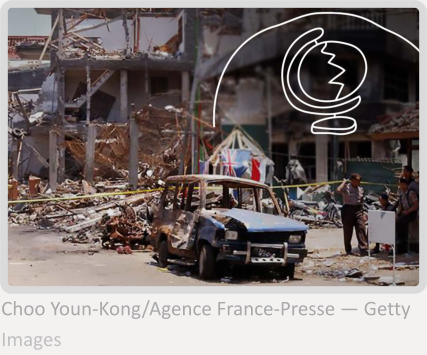

© 2023 Oriental Institute, The Czech Academy of Sciences, Kevin L. Schwartz, and Ameem Lutfi


The
terrorist
attacks
of
9/11
on
American
soil
altered
not
only
the
international
security
environment
but
also
the
domestic
power
equilibrium
in
several
Southeast
Asian
countries.
The
incumbent
Malaysian
and
Philippine
governments
used
the
situation
to
beef
up
their
positions
by
cracking
down
on
militant
Islamist
groups.
1
But
in
Indonesia,
the
world´s
largest
Muslim-majority
country,
the
cabinet´s
response
against
Islamist
extremists
was
both
largely
insufficient
and
disappointing.
The
initial
inaction
of
Megawati
Soekarnoputri´s
administration
may
be
explained
by
the
president's
desire
to
avoid
antagonizing
the
country's
popular
Islamic
circles.
The
same
can
be
said
of
the
Indonesian
armed
forces
—
Tentara
Nasional
Indonesia
or
TNI
—
which
did
not
want
to
alienate
the
forces
of
political Islam that were growing increasingly powerful in the liberated milieu of post-1998 Indonesia.
It
did
not
help
that
Vice-President
Hamzah
Haz,
chair
of
a
conservative
Islamic
party,
openly
sympathized
with
radical
Islamist
groupings
and
was
critical
when
Megawati,
a
secular
politician,
showed
a
degree
of
willingness
to
cooperate
with
Western
allies.
But,
on
the
whole,
the
country's
leadership
seemed
to
have
been
in
denial
of
the
threat
arising
from
a
large
terrorist
organization
operating
across
the
archipelago.
Some
leading
politicians
and
top-brass
generals
even
bragged
about
their
friendly
ties
with
hardline
Islamists.
Among
them
was
the
then
speaker
of
the
House
of
Representatives,
Amien
Rais,
who
mobilized
a
million-strong
demonstration
in
support
of
Muslims
fighting
Christians
in
Indonesia’s
Maluku
Islands
in
2000.
Megawati´s
cabinet
kept
underestimating
the
warnings
from
U.S.
and
Singaporean
intelligence
concerning
the
Jemaah
Islamiyah
(JI),
a
terrorist
network
loosely
linked
to
al-Qaeda.
This
disregard
led
to
temporary
friction in U.S.-Indonesia relations over what the United States must have perceived as Indonesia´s failure to support their Global War on Terror campaign
The
massive
terrorist
attack
of
12
October
2002
on
entertainment
venues
in
the
tourist
resort
of
Kuta,
known
as
the
Bali
Bombing,
in
which
202
people,
including
eighty-nine
foreigners,
were
killed,
came
as
a
harsh
wake-up
call,
following
which
the
Indonesian
government
was
forced
to
admit
to
the
existence
of
terrorist
groups
on
the
country’s
soil.
The
cabinet´s
response
was
immediate,
a
result
of
finally
realizing
the
country's
vulnerability
—
the
economic
impact
of
the
attack
and
drastic
drop
in
tourism
—
and
U.S.
pressure.
Megawati
agreed
to
the
formation
of
a
joint
team
of
Australian,
British,
and
U.S.
police
to
assist
in
the
investigation.
The
security
forces
detained
Abu
Bakar
Baasyir,
the
spiritual
leader
of
JI,
in
a
move
the
police
had
previously
claimed as impossible owing to a lack of evidence. Furthermore, the cabinet issued a regulation boosting its legal powers to fight terrorism (PERPU 1/2002), which allowed detention of suspects
up to six months without trial.
It
was
apparent
that
President
Megawati
had
become
serious
about
pursuing
an
anti-terrorism
campaign.
Soon
after
the
bombing,
thirty-three
terrorist
suspects
were
arrested,
including
the
key
figures
behind
the
attacks
—
the
brothers
Mukhlas,
Ali
Imron,
and
Amrozi,
as
well
as
Imam
Samudra.
They
were
put
on
trial
and
the
former
three
were
sentenced
to
death,
while
the
latter
received
a
life
sentence
since
he
showed
remorse.
2
By
handing
down
these
sentences,
the
Indonesian
judiciary
showed
an
uncompromising
stance
toward
terrorism,
but
it
is
noteworthy
that
the
convicts
were
given
unprecedented
media
attention
and
treated
as
rock
stars
when
interviewed
before
the
execution.
Abu
Bakar
himself
got
away
with
only
a
four-year
sentence
for
treason, thanks to the support of the vice-president.
In
spite
of
these
controversies,
the
government
showed
determination
by
creating
a
special
anti-terrorist
police
task
force,
known
as
Densus
88
(Detasemen
Khusus
88,
or
“Special
Detachment
88”),
which
hunted
down
other
JI
members
and
generally
succeeded
in
disrupting
the
group’s
network.
In
addition,
the
Laskar
Jihad
militia,
which
joined
in
the
ethno-religious
strife
against
Christians in the Malukus, was disbanded in 2003 and its leader, Umar Thalib, sent to prison in the aftermath of the Bali Bombing.
Megawati´s
successor,
Susilo
Bambang
Yudhoyono
(2004−2014),
however,
showed
greater
leniency
towards
Islamist
radical
movements.
One
of
these
was
the
high-profile
vigilante
group
Front
Pembela
Islam
(Islamic
Defenders´
Front
or
FPI),
which
“specialized”
in
raids
against
“places
of
vice,”
such
as
night
clubs,
and
waged
a
violent
campaign
against
the
Ahmadiyya
sect
and
other
religious
minorities.
The
perpetrators
of
violence
typically
got
away
with
severely
low
sentences,
while
the
victims
were
often
subjected
to
discrimination.
This
situation
may
be
explained
by
the
hardliners´
cordial
ties
with
high-powered
patrons
among
the
police,
who
did
not
wish
to
appear
anti-Islamic.
But
there
may
be
another
explanation.
While
the
Yudhoyono
administration
was
convinced
that
international
terrorism
had
to
be
stopped
by
any
means
possible,
due
to
the
tarnishing
of
Indonesia´s
international
image
and
ruined
economy,
it
also
believed
that
Islamist
radicalism
cannot
be
completely
eradicated
and
thus
reasoned
it
was
best
to
allow
radical
movements
to
redirect
their
aggressiveness
toward
domestic
minority
groups
like
the
Ahmadiyya
and
Shia.
3
The
trend
of
hunting
down
terrorists
by
Densus
88
continued
under
the
new
president
Joko
Widodo
(2014–).
However,
the
influence
of
hardline
Islamist
movements
came
to
the
fore
in
late
2016,
when
they
mobilized
half
a
million
followers
in
Jakarta
to
protest
against
the
Christian-Chinese
governor
of
the
capital
city,
Basuki
Tjahaja
Purnama,
also
known
as
“Ahok.”
A
tampered
video
of
his
alleged
blasphemy
against
Islam
was
circulated
and,
as
a
result
of
this
concentrated
pressure,
Ahok
not
only
lost
the
gubernatorial
election
in
February
2017
but
also
was
sentenced
to two years in prison the following May.
Wary
of
radical
Islam’s
growing
popularity
after
the
Ahok
protests,
the
Indonesian
government,
in
another
twist,
once
again
started
cracking
down
on
Islamist
groups.
It
banned
one
of
these
groupings,
Hizbut
Tahrir
Indonesia
(HTI),
which
did
not
promote
violence,
but
ideologically
strove
for
the
establishment
of
an
Islamic
caliphate.
In
late
2020,
a
similar
action
was
taken
against
the
FPI.
Following
the
return
of
its
leader,
Habib
Rizieq,
from
exile
in
Saudi
Arabia,
the
movement
became
re-energized,
causing
havoc
in
the
capital.
The
group's
leader
was
apprehended
for
not complying with COVID-19 protocols and, on 30 December 2020, the group was banned.
The
move
against
Rizieq
signals
that
the
Indonesian
government
is
finally
determined
to
crush
not
only
terrorist
networks
per
se
but
also
other
hardline
Islamist
groups,
especially
those
that
cross the line by posing a challenge to the government and threatening to destabilize the country.







If you are interested in contributing an article for
the project, please send a short summary of the
proposed topic (no more than 200 words) and brief
bio to submissions@911legacies.com. For all
other matters, please contact
inquiry@911legacies.com.

CONTACT


The
terrorist
attacks
of
9/11
on
American
soil
altered
not
only
the
international
security
environment
but
also
the
domestic
power
equilibrium
in
several
Southeast
Asian
countries.
The
incumbent
Malaysian
and
Philippine
governments
used
the
situation
to
beef
up
their
positions
by
cracking
down
on
militant
Islamist
groups.
1
But
in
Indonesia,
the
world´s
largest
Muslim-majority
country,
the
cabinet´s
response
against
Islamist
extremists
was
both
largely
insufficient
and
disappointing.
The
initial
inaction
of
Megawati
Soekarnoputri´s
administration
may
be
explained
by
the
president's
desire
to
avoid
antagonizing
the
country's
popular
Islamic
circles.
The
same
can
be
said
of
the
Indonesian
armed
forces
—
Tentara
Nasional
Indonesia
or
TNI
—
which
did
not
want
to
alienate
the
forces
of
political
Islam
that
were
growing
increasingly
powerful
in
the
liberated
milieu
of
post-1998
Indonesia.
It
did
not
help
that
Vice-President
Hamzah
Haz,
chair
of
a
conservative
Islamic
party,
openly
sympathized
with
radical
Islamist
groupings
and
was
critical
when
Megawati,
a
secular
politician,
showed
a
degree
of
willingness
to
cooperate
with
Western
allies.
But,
on
the
whole,
the
country's
leadership
seemed
to
have
been
in
denial
of
the
threat
arising
from
a
large
terrorist
organization
operating
across
the
archipelago.
Some
leading
politicians
and
top-brass
generals
even
bragged
about
their
friendly
ties
with
hardline
Islamists.
Among
them
was
the
then
speaker
of
the
House
of
Representatives,
Amien
Rais,
who
mobilized
a
million-strong
demonstration
in
support
of
Muslims
fighting
Christians
in
Indonesia’s
Maluku
Islands
in
2000.
Megawati´s
cabinet
kept
underestimating
the
warnings
from
U.S.
and
Singaporean
intelligence
concerning
the
Jemaah
Islamiyah
(JI),
a
terrorist
network
loosely
linked
to
al-Qaeda.
This
disregard
led
to
temporary
friction
in
U.S.-Indonesia
relations
over
what
the
United
States
must
have
perceived
as
Indonesia´s
failure
to support their Global War on Terror campaign
The
massive
terrorist
attack
of
12
October
2002
on
entertainment
venues
in
the
tourist
resort
of
Kuta,
known
as
the
Bali
Bombing,
in
which
202
people,
including
eighty-nine
foreigners,
were
killed,
came
as
a
harsh
wake-up
call,
following
which
the
Indonesian
government
was
forced
to
admit
to
the
existence
of
terrorist
groups
on
the
country’s
soil.
The
cabinet´s
response
was
immediate,
a
result
of
finally
realizing
the
country's
vulnerability
—
the
economic
impact
of
the
attack
and
drastic
drop
in
tourism
—
and
U.S.
pressure.
Megawati
agreed
to
the
formation
of
a
joint
team
of
Australian,
British,
and
U.S.
police
to
assist
in
the
investigation.
The
security
forces
detained
Abu
Bakar
Baasyir,
the
spiritual
leader
of
JI,
in
a
move
the
police
had
previously
claimed
as
impossible
owing
to
a
lack
of
evidence.
Furthermore,
the
cabinet
issued
a
regulation
boosting
its
legal
powers
to
fight
terrorism
(PERPU
1/2002),
which
allowed
detention
of
suspects up to six months without trial.
It
was
apparent
that
President
Megawati
had
become
serious
about
pursuing
an
anti-terrorism
campaign.
Soon
after
the
bombing,
thirty-three
terrorist
suspects
were
arrested,
including
the
key
figures
behind
the
attacks
—
the
brothers
Mukhlas,
Ali
Imron,
and
Amrozi,
as
well
as
Imam
Samudra.
They
were
put
on
trial
and
the
former
three
were
sentenced
to
death,
while
the
latter
received
a
life
sentence
since
he
showed
remorse.
2
By
handing
down
these
sentences,
the
Indonesian
judiciary
showed
an
uncompromising
stance
toward
terrorism,
but
it
is
noteworthy
that
the
convicts
were
given
unprecedented
media
attention
and
treated
as
rock
stars
when
interviewed
before
the
execution.
Abu
Bakar
himself
got
away
with
only
a
four-year
sentence
for
treason,
thanks
to
the
support
of
the
vice-
president.
In
spite
of
these
controversies,
the
government
showed
determination
by
creating
a
special
anti-
terrorist
police
task
force,
known
as
Densus
88
(Detasemen
Khusus
88,
or
“Special
Detachment
88”),
which
hunted
down
other
JI
members
and
generally
succeeded
in
disrupting
the
group’s
network.
In
addition,
the
Laskar
Jihad
militia,
which
joined
in
the
ethno-religious
strife
against
Christians
in
the
Malukus,
was
disbanded
in
2003
and
its
leader,
Umar
Thalib,
sent
to
prison
in
the
aftermath of the Bali Bombing.
Megawati´s
successor,
Susilo
Bambang
Yudhoyono
(2004−2014),
however,
showed
greater
leniency
towards
Islamist
radical
movements.
One
of
these
was
the
high-profile
vigilante
group
Front
Pembela
Islam
(Islamic
Defenders´
Front
or
FPI),
which
“specialized”
in
raids
against
“places
of
vice,”
such
as
night
clubs,
and
waged
a
violent
campaign
against
the
Ahmadiyya
sect
and
other
religious
minorities.
The
perpetrators
of
violence
typically
got
away
with
severely
low
sentences,
while
the
victims
were
often
subjected
to
discrimination.
This
situation
may
be
explained
by
the
hardliners´
cordial
ties
with
high-powered
patrons
among
the
police,
who
did
not
wish
to
appear
anti-
Islamic.
But
there
may
be
another
explanation.
While
the
Yudhoyono
administration
was
convinced
that
international
terrorism
had
to
be
stopped
by
any
means
possible,
due
to
the
tarnishing
of
Indonesia´s
international
image
and
ruined
economy,
it
also
believed
that
Islamist
radicalism
cannot
be
completely
eradicated
and
thus
reasoned
it
was
best
to
allow
radical
movements
to
redirect
their
aggressiveness
toward
domestic
minority
groups
like
the
Ahmadiyya and Shia.
3
The
trend
of
hunting
down
terrorists
by
Densus
88
continued
under
the
new
president
Joko
Widodo
(2014–).
However,
the
influence
of
hardline
Islamist
movements
came
to
the
fore
in
late
2016,
when
they
mobilized
half
a
million
followers
in
Jakarta
to
protest
against
the
Christian-Chinese
governor
of
the
capital
city,
Basuki
Tjahaja
Purnama,
also
known
as
“Ahok.”
A
tampered
video
of
his
alleged
blasphemy
against
Islam
was
circulated
and,
as
a
result
of
this
concentrated
pressure,
Ahok
not
only
lost
the
gubernatorial
election
in
February
2017
but
also
was
sentenced
to
two
years
in
prison
the
following May.
Wary
of
radical
Islam’s
growing
popularity
after
the
Ahok
protests,
the
Indonesian
government,
in
another
twist,
once
again
started
cracking
down
on
Islamist
groups.
It
banned
one
of
these
groupings,
Hizbut
Tahrir
Indonesia
(HTI),
which
did
not
promote
violence,
but
ideologically
strove
for
the
establishment
of
an
Islamic
caliphate.
In
late
2020,
a
similar
action
was
taken
against
the
FPI.
Following
the
return
of
its
leader,
Habib
Rizieq,
from
exile
in
Saudi
Arabia,
the
movement
became
re-energized,
causing
havoc
in
the
capital.
The
group's
leader
was
apprehended
for
not
complying
with
COVID-19
protocols
and,
on
30 December 2020, the group was banned.
The
move
against
Rizieq
signals
that
the
Indonesian
government
is
finally
determined
to
crush
not
only
terrorist
networks
per
se
but
also
other
hardline
Islamist
groups,
especially
those
that
cross
the
line
by
posing
a
challenge
to
the
government
and
threatening
to
destabilize
the
country.
© 2023 Oriental Institute, The Czech Academy of Sciences,
Kevin L. Schwartz, and Ameem Lutfi


Written by




If you are interested in contributing an article for the
project, please send a short summary of the proposed
topic (no more than 200 words) and brief bio to
submissions@911legacies.com. For all other
matters, please contact inquiry@911legacies.com.

CONTACT


















